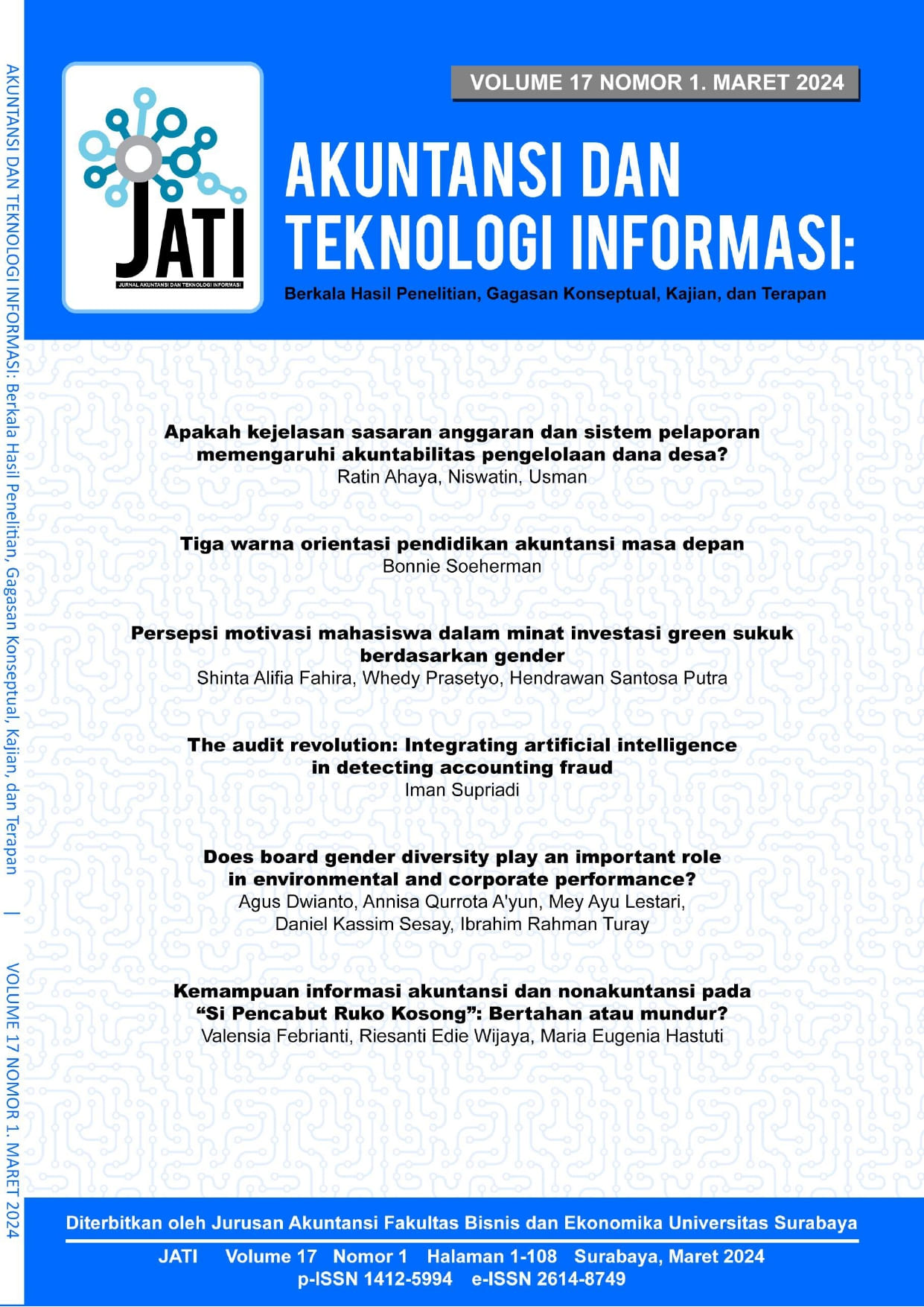Tiga warna orientasi pendidikan akuntansi masa depan
 Abstract Views:
396 times
Abstract Views:
396 times
 PDF Downloads:
500 times
PDF Downloads:
500 times
Abstract
The WEF 2020 report has disrupted the world of education and the accounting profession. The role of accounting, traditionally carried out by humans, is gradually being overshadowed by technology. The sustainability of this profession serves as the primary background for this research, along with the direction and orientation of the future development of the accounting discipline, questioning its continued relevance. This study aims to analyze the future development, challenges, and opportunities in accounting education. It also seeks to construct a conceptual model for the orientation of accounting education development that aligns with the times. The research results are expected to contribute to developing educational curricula and the accounting profession. This study employs an interpretive-constructive approach through literature review. This research's analysis, mapping, and interpretative processes revealed three orientations in the development of accounting education referred to as Red, Green, and Blue (RGB) Accounting. Each represents standardization, globalization, geopolitics, sustainability, and innovation and technology. These three colors, known as True Tone, are expected to strongly influence accounting practices and serve as a crucial reference in the development of accounting education curricula.
Downloads
References
Al-Esia, Z., Crane, A., & Iatridis, K. (2024). Political CSR and Populism: Toward an Information Based Theory of Political CSR. Business and Society, 63(2), 373–408. https://doi.org/10.1177/00076503231168078
Al-Hazaima, H., Low, M., & Sharma, U. (2020). Perceptions of Salient Stakeholders on the Integration of Sustainability Education into the Accounting Curriculum: A Jordanian Study. Meditari Accountancy Research, 29(2), 371–402. https://doi.org/10.1108/MEDAR-02-2020-0708
Anandarajan, M., Anandarajan, A., & Srinivasan, C. A. (2004). Business Intelligence Techniques: A Perspective from Accounting and Finance. Business Intelligence Techniques. https://doi.org/10.1007/978-3-540-24700-5
Cahyonowati, N., & Ratmono, D. (2012). Adopsi IFRS dan Relevansi Nilai Informasi Akuntansi. Jurnal Akuntansi dan Keuangan, 14(2), 105–115. https://doi.org/https://doi.org/10.9744/jak.14.2.105-115
Efferin, S., & Soeherman, B. (2024). Mindfulness for Sustainable Development: A Case of Accounting Education in Indonesia. Accounting Education, 1–28. https://doi.org/10.1080/09639284.2024.2303730
Ericson, T., Kjønstad, B. G., & Barstad, A. (2014). Mindfulness and Sustainability. Ecological Economics, 104, 73–79. https://doi.org/https://doi.org/10.1016/j.ecolecon.2014.04.007
Frey, C. B., & Osborne, M. A. (2017). The Future of Employment: How Susceptible are Jobs to Computerisation? Technological Forecasting and Social Change, 114, 254–280. https://doi.org/10.1016/j.techfore.2016.08.019
Gipper, B., Lombardi, B. J., & Skinner, D. J. (2013). The Politics of Accounting Standard-Setting: A Review of Empirical Research. Australian Journal of Management, 38(3), 523–551. https://doi.org/10.1177/0312896213510713
Gray, R. (2019). Sustainability Accounting and Education: Conflicts and Possibilities. Incorporating Sustainability in Management Education: An Interdisciplinary Approach, 33–54. https://doi.org/10.1007/978-3-319-98125-3_3
Grinin, L., Grinin, A., & Korotayev, A. (2022). COVID-19 Pandemic as a Trigger for the Acceleration of the Cybernetic Revolution, Transition from E-Government to E-State, and Change in Social Relations. Technological Forecasting and Social Change, 175. https://doi.org/10.1016/j.techfore.2021.121348
Heller, I. (2022). How Technology Is Transforming Accounting. Forbes.
Königsgruber, R. (2010). A Political Economy of Accounting Standard Setting. Journal of Management and
Governance , 14(4), 277–295. https://doi.org/10.1007/s10997-009-9101-1
Kurniawan, E. C., Soeherman, B., & Sutedjo, S. (2023). Disrupsi Teknologi dalam Kantor Jasa Akuntan: Sebuah Peringatan. Jurnal Akuntansi Multiparadigma, 14(1), 50–74. https://doi.org/10.21776/ub.jamal.2023.14.1.04
Leavy, B. (2011). Vijay Govindarajan: Innovation Coach to the Developed and Developing World. Strategy & Leadership, 39(5), 4–12. https://doi.org/10.1108/10878571111161471
Moura-Leite, R. C., & Padgett, R. C. (2011). Historical Background of Corporate Social Responsibility. Social Responsibility Journal, 7(4), 528–539. https://doi.org/10.1108/1747111111117511
Odek, R., & Kimanzi, K. (2023). Political Influences on Accounting Standards: A Discussion of GAAP & IFRS. Accounting and Finance Studies, 3(1), 315–324. https://doi.org/10.47153/afs31.5562023
Pacioli, L. (1975). The Rules of Double-Entry Bookkeeping: Particularis De Computis Et Scripturis (First Edition). CreateSpace.
Patton, M. Q. (2002). Qualitative Research & Evaluation Methods (Third Edition). SAGE.
Ries, E. (2011). The Lean Startup: How Today’s Entrepreneurs Use Continuous Innovation to Create Radically Successful Businesses. Crown Business.
Salsabila, A. (2023). Sejarah CSR: Bagaimana Awal Perkembangan hingga Kini? Lindungihutan.
Soeherman, B., & Putra, A. S. (2023). Metafora “Kuda Troya” dalam Asem (Addictive Sustainable Ecosystem Model): Studi Kasus Akuntansi Inovasi pada Ekosistem Tiktok. Sarasehan Akuntansi Multiparadigma: Peran Akuntansi Pancasila di Era Invasi Artificial Intelligence dan Ekonomi Global.
Sugiharti, L., Yasin, M. Z., Purwono, R., Esquivias, M. A., & Pane, D. (2022). The FDI Spillover Effect on the Efficiency and Productivity of Manufacturing Firms: Its Implication on Open Innovation. Journal of Open Innovation: Technology, Market, and Complexity, 8(2), 99. https://doi.org/10.3390/joitmc8020099
Sukoharsono, E. G. (2012). Luca Pacioli’s Response to Accounting whereabout: An Imaginary Spiritual Dialogue. Jurnal Akuntansi Multiparadigma, 3(3), 457–470. https://doi.org/https://doi.org/10.18202/jamal.2012.12.7174
Thiermann, U. B., & Sheate, W. R. (2021). The Way Forward in Mindfulness and Sustainability: A Critical Review and Research Agenda. Journal of Cognitive Enhancement, 5(1), 118–139. https://doi.org/10.1007/s41465-020-00180-6
World Economic Forum. (2020). The Future of Jobs Report 2020. https://www.weforum.org/reports/the-future-of-jobs-report-2020?fbclid=IwAR3FXdpArwyKl_VPpJ7TIf2juGfXwV7LsYNi5NOU_YbzA9uelIVUUncNtIQ#report-nav

This work is licensed under a Creative Commons Attribution-ShareAlike 4.0 International License.
- Copyright on articles is retained by the respective author(s), without restrictions. A non-exclusive license is granted to Akuntansi dan Teknologi Informasi (JATI) to publish the article and identify itself as its original publisher, along with the commercial right to include the article in a hardcopy issue for sale to libraries and individuals.
- Articles published in Akuntansi dan Teknologi Informasi (JATI) are licensed under a Creative Commons Attribution-ShareAlike 4.0 International license. You are free to copy, transform, or redistribute articles for any lawful purpose in any medium, provided you give appropriate credit to the original author(s) and the journal, link to the license, indicate if changes were made, and redistribute any derivative work under the same license.
- By publishing in Akuntansi dan Teknologi Informasi (JATI), authors grant any third party the right to use their article to the extent provided by the Creative Commons Attribution-ShareAlike 4.0 International license.

 DOI:
DOI:









